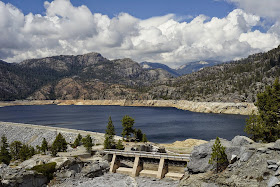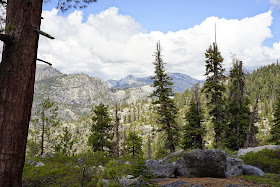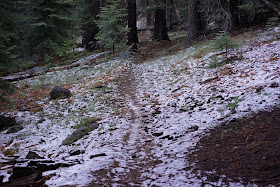Dale Matson
As an experienced backpacker, there were times when I felt a
kinship with the author Cheryl Strayed. I too remember the panicky feeling of
being out of water and not knowing where the next source would be. Of being
tired but having to travel further to camp for the night because the water
indicated on the map was only a seasonal flow.
There is a more primal, sensual earned sense of
self-efficacy navigating through the wilderness by oneself. Post holing through
snow, not certain where the trail is can be a dilemma with part of you craving
the destination and part of you wanting to backtrack to the certainty of a
known location. Trusting your gear and trusting yourself is different than
being killed by an ego that presses the fatigued body to a point of delusional
exhaustion.
Her journey had the potential to be transformative. It is
like so many journeys before with the ancient Telemachia as an archetype. It
could have led to greater self understanding for the, “The Queen Of The PCT”.
Yet, in the midst of the harshness of the trail, Strayed’s suffering seems to
be her ever-present state of mind whether it is her physical discomfort or the
pain of memories. She is toughened by the trail but she is not softened by it.
Did it ever occur to her at the end that she was lucky to be alive with such
poor preparation?
As I read her story of the trail interwoven with her
childhood memories, the early death of her mother and her leaving her husband,
there seemed to be self-absorption. I kept saying to myself, why doesn’t she
stay with some of these fellow travelers? Why does she always press on alone?
I have read two books that remind me of her memoir. One was Gulliver’s
Travels by Jonathan Swift. In the end the journey is wasted on Gulliver. In
Jack Kerouac’s On The Road, there is the same hedonistic wandering with
dubious moral anchoring. Kerouac and his friends were Hobos of sorts and one of
the characters in her book insists on calling Strayed a Hobo too.
She says this at one point. “What if I forgave myself? I
thought. What if I forgave myself, even though I'd done something I shouldn't
have? What if I was a liar and a cheat and there was no excuse for what I'd
done other than because it was what I wanted and needed to do? What if I was
sorry, but if I could go back in time I wouldn't do anything differently than
what I had done? What if I'd actually wanted to f*** those men? [Kindle Fire
location 4541]
There is no doubt about the physical nature of her suffering
on the trail since we are reminded on almost every page about her damaged feet
regardless of boot sizes. I think she saw herself as an orphan survivor of her
family and a survivor of the Pacific Crest Trail. She will inspire other lost
souls to take her journey for one reason or another, many because it has become
the thing to do. It is all the rage. Some will be even less prepared.
“It was my life-like all lives, mysterious and irrevocable
and sacred. So very close, so very present, so very belonging to me.” So alone.
Trail name "Padre"













































